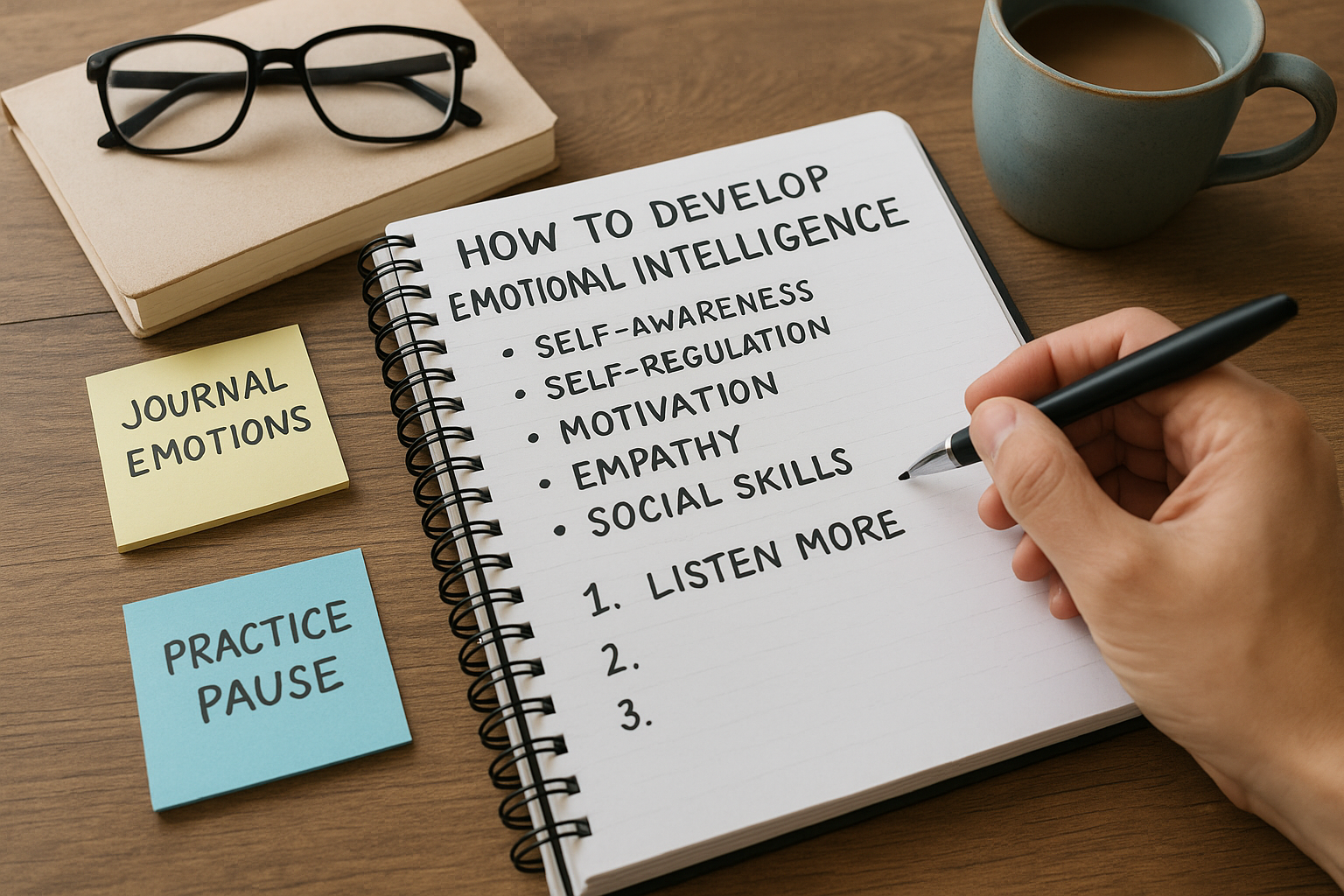Emotional intelligence (EQ) is one of the most valuable life skills you can build. It helps you handle relationships with more ease, manage stress more effectively, and make wiser decisions. Unlike IQ, emotional intelligence is something you can actively develop over time—and the benefits are profound.
In this article, we’ll break down what emotional intelligence really is, why it matters, and how you can improve it in your daily life.
What Is Emotional Intelligence?
Emotional intelligence is the ability to:
- Recognize your own emotions
- Understand what those emotions mean
- Regulate your reactions
- Recognize and respect the emotions of others
- Communicate effectively and compassionately
High emotional intelligence doesn’t mean ignoring your feelings—it means being aware and intentional about how you respond to them.
Why Emotional Intelligence Matters
EQ has a deep impact on many areas of your life:
- Stronger relationships
- Better communication at work and home
- Increased empathy and trust
- Reduced stress and anxiety
- More effective conflict resolution
- Greater self-confidence and inner peace
People with high EQ tend to be better leaders, better friends, and more balanced individuals.
The 5 Core Components of Emotional Intelligence
According to psychologist Daniel Goleman, EQ has five key elements:
1. Self-Awareness
Being able to notice and name your emotions in real time.
Questions to ask:
- What am I feeling right now?
- Why do I feel this way?
- How is this feeling influencing my behavior?
2. Self-Regulation
Managing your impulses and emotional reactions in a healthy way.
Examples:
- Taking a deep breath before replying in anger
- Walking away from a heated situation
- Practicing calming techniques like mindfulness
3. Motivation
Using emotions to fuel positive action, not procrastination or self-doubt.
Traits of emotionally intelligent motivation:
- Setting meaningful goals
- Staying resilient during setbacks
- Maintaining a growth mindset
4. Empathy
Recognizing and honoring the emotions of others.
Ways to practice:
- Listening without interrupting
- Putting yourself in someone else’s shoes
- Noticing non-verbal cues like tone and body language
5. Social Skills
Building healthy relationships through clear, respectful communication.
This includes:
- Giving and receiving feedback gracefully
- Managing conflict with compassion
- Building trust over time
How to Start Developing Emotional Intelligence
1. Journal Your Emotions
Every day, spend five minutes reflecting on:
- What emotions you felt
- What triggered them
- How you responded
- What you learned from the experience
This builds emotional vocabulary and helps you spot patterns.
2. Practice the Pause
When you feel a strong emotion rising—pause.
Ask yourself:
- Is this reaction helpful or harmful?
- Can I respond differently?
Even a 10-second pause can change the outcome of an entire situation.
3. Learn to Name What You Feel
Instead of “I’m upset,” try being more specific:
- “I feel rejected.”
- “I feel anxious.”
- “I feel disrespected.”
The more precisely you can name your emotions, the more clearly you can understand and manage them.
4. Listen More Than You Speak
During conversations:
- Focus fully on the other person
- Avoid planning your reply while they speak
- Reflect back what they said to show understanding
- Ask questions that show care and curiosity
This builds trust and connection.
5. Develop Empathy Through Curiosity
When someone reacts in a way you don’t understand, pause your judgment and ask:
- What might they be feeling right now?
- What could be going on in their life that I don’t know?
- How would I feel if I were in their shoes?
Empathy doesn’t mean agreeing—it means understanding.
6. Use “I” Statements
In conflict or sensitive conversations, speak from your experience:
- “I feel frustrated when deadlines aren’t clear.”
- “I need more time to prepare for meetings.”
- “I was hurt by what happened yesterday.”
This avoids blame and promotes honest, respectful dialogue.
7. Reflect on Your Triggers
We all have emotional “buttons.” Knowing yours helps you manage them.
Ask:
- What situations make me overreact?
- Are these based on past wounds or fears?
- How can I approach them more mindfully?
Awareness of your triggers is a superpower.
Emotional Intelligence at Work and Home
At work, EQ helps you:
- Lead with empathy
- Navigate office politics
- Communicate under pressure
- Collaborate with diverse personalities
At home, EQ helps you:
- Resolve conflicts without escalation
- Show up with compassion for loved ones
- Create a peaceful, supportive environment
Whether in a meeting or a personal relationship, emotional intelligence makes you more present, compassionate, and resilient.
Make EQ a Daily Practice
Emotional intelligence is like a muscle—the more you use it, the stronger it gets.
Start here:
- Journal one emotion at the end of today
- Practice a pause before responding to something triggering
- Choose empathy over judgment in one interaction
You don’t need to be perfect. Growth in emotional intelligence is a process, and every step you take adds value to your life and to those around you.
The more emotionally intelligent you become, the more empowered, grounded, and fulfilled you’ll feel—every day.
